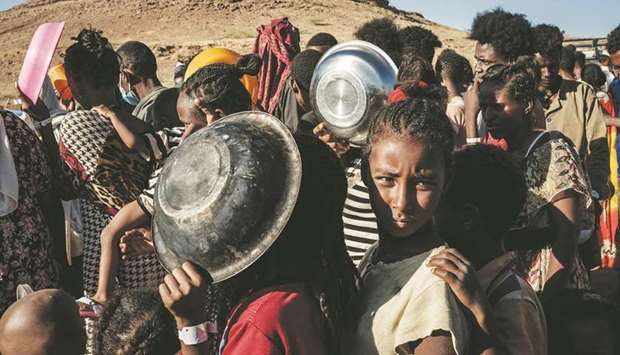Sudan’s premier said yesterday he had agreed with his counterpart in Addis Ababa to hold an urgent meeting of a bloc of east African countries to resolve the crisis in Ethiopia’s Tigray region.
Ethiopia did not immediately confirm Sudanese Prime Minister Abdallah Hamdok’s announcement of an “emergency” meeting of the Intergovernmental Authority on Development.
Hamdok travelled to Addis Ababa yesterday to discuss the Tigray conflict with his counterpart Prime Minister Abiy Ahmed, the first foreign leader to visit the Ethiopian capital since fighting broke out in the region on November 4, creating a humanitarian crisis.
“The visit led to fruitful negotiations and it was agreed to hold an emergency IGAD meeting,” Hamdok’s office said.
IGAD was founded in 1996 and brings together the east African nations of Ethiopia, Sudan, Djibouti, Kenya, Somalia, South Sudan and Uganda.
Thousands have been killed since the start of the conflict in Tigray, according to the International Crisis Group, and just over 50,000 people have fled to neighbouring Sudan since Abiy ordered troops into the region to confront its dissident ruling party.
A Sudanese government official said the meeting between Hamdok and Abiy had been “fruitful, especially on the emergency meeting of IGAD” and on reviving a committee to work on delineating their shared border.
Abiy, winner of last year’s Nobel Peace Prize, said Hamdok expressed support for the offensive against the Tigray People’s Liberation Front (TPLF) during face-to-face talks.
“The Sudanese side reiterated their solidarity with the government of Ethiopia in the law enforcement operations it has been undertaking,” said a statement from Abiy’s office.
Hamdok also recalled support Abiy had previously extended to Sudan, it added.
The Sudanese premier had urged Abiy to engage in negotiations with the TPLF when fighting broke out six weeks ago, and encouraged African mediation to resolve the conflict as it threatened to draw in the wider region. Abiy has resisted international pressure to end the fighting and accept mediation, saying TPLF leaders needed to be disarmed and apprehended. On November 28 he declared the conflict over, saying the army had captured the regional capital Mekele.
He has dismissed reports of ongoing clashes as “sporadic gunfire” not indicating major combat. Over the weekend, AFP journalists saw trucks of soldiers heading towards Tigray, and ambulances remain a common sight in southern Tigray and northern Amhara regions.
Tens of thousands of refugees have crossed the border westward into one of the most impoverished regions of Sudan.
They have arrived in a country in the midst of a fragile political transition since last year’s ouster of president Omar al-Bashir, along with an economic crisis that has been particularly harsh on the eastern states where Tigray refugees have arrived. Around 170 refugees crossed into Sudan from Tigray on Saturday, according to the United Nations refugee agency UNHCR, compared to 1,100 on December 3.

Ethiopian refugee children who fled the Tigray conflict wait in a line for a food distribution by Muslim Aid at the Um Raquba refugee camp in Sudan’s eastern Gedaref state.
